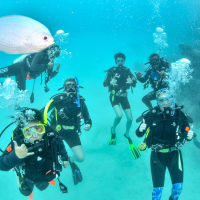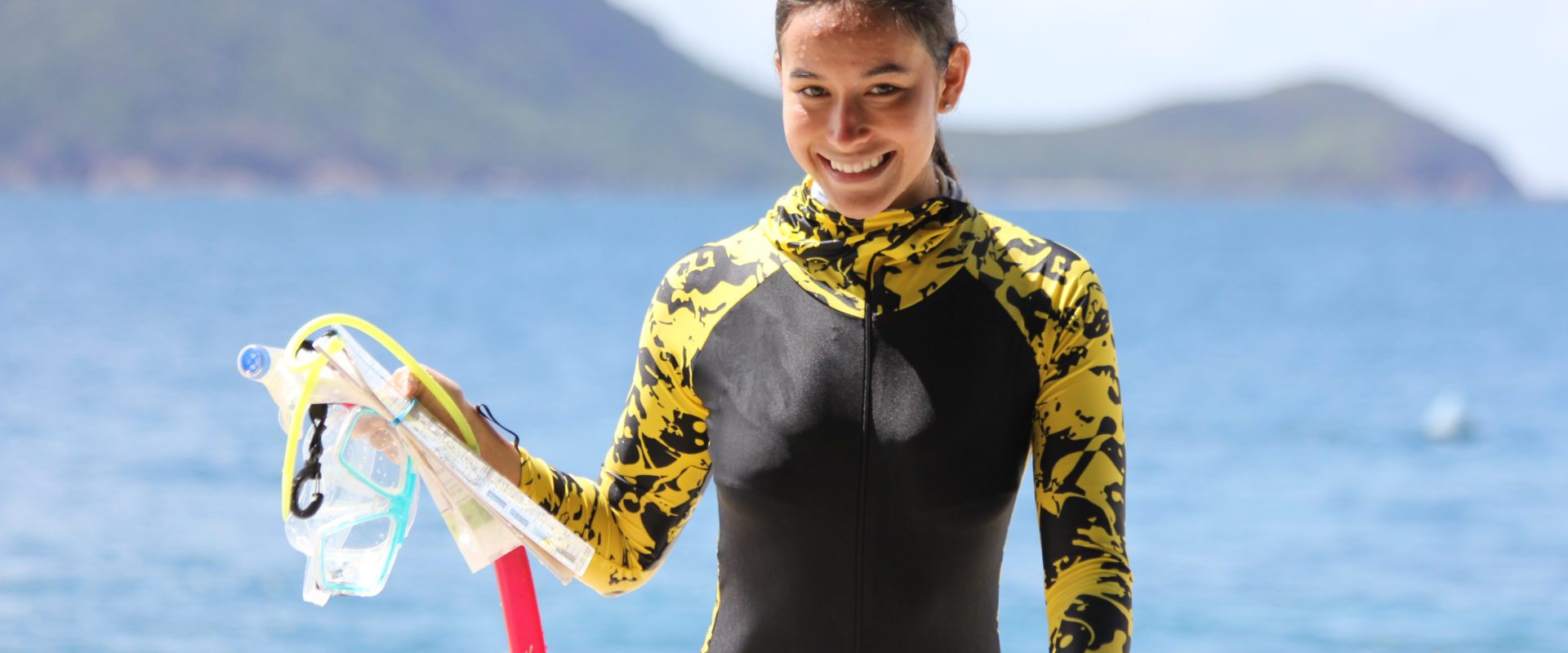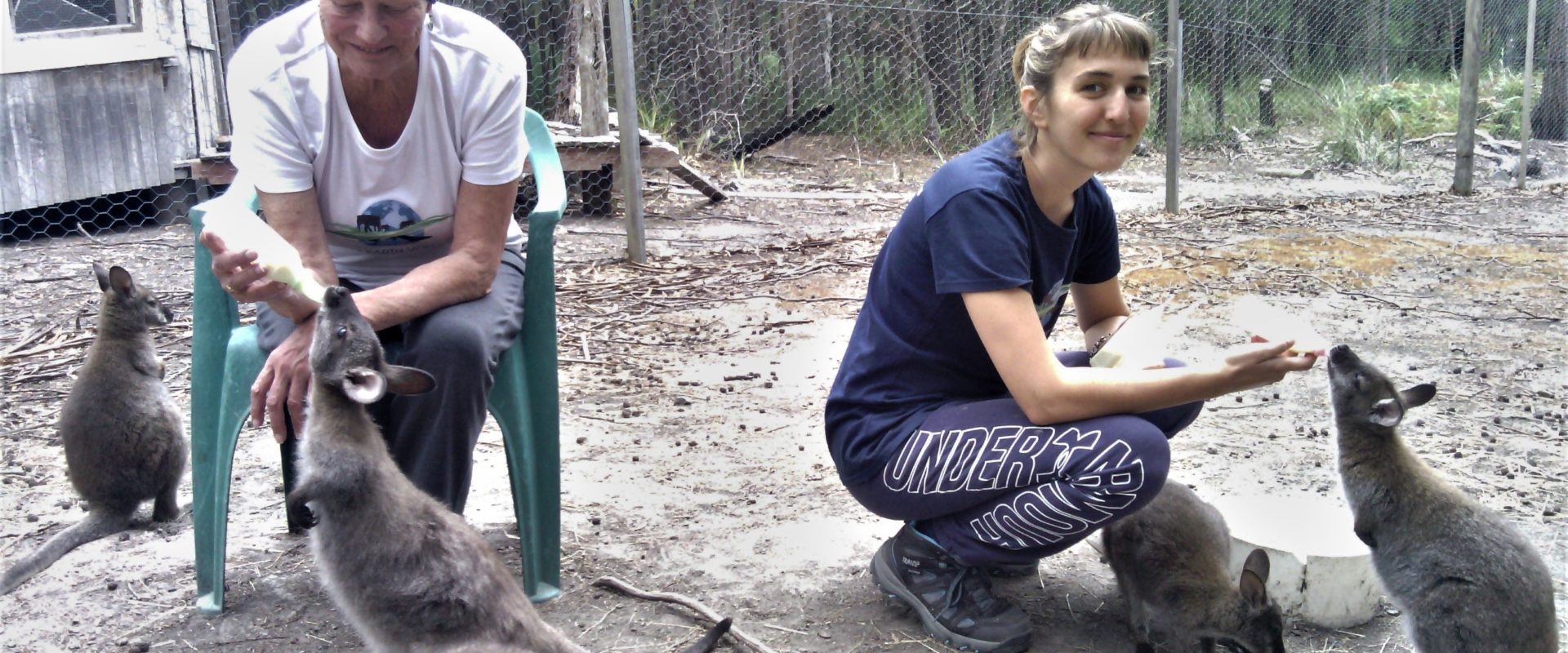Great Barrier Reef Marine Conservation
Promoting environmental protection and sustainability, this unique dive program is conducted on the stunning Great Barrier Reef and is designed for volunteers interested in scuba diving, marine conservation and citizen science.
Cairns, Queensland, Australia
There is no better place to Learn to Dive than Australia’s Great Barrier Reef. Combine this with some awesome marine conservation activities and you will have the time of your life!
Oceans 2 Earth Volunteers offer volunteers an exciting Marine Conservation program on The Great Barrier Reef. Focusing on environmental protection and sustainability, this unique program is designed for volunteers interested in scuba diving, marine conservation, citizen science and education, and for those wanting to create some special moments on this endangered wonder, one of the most stunning reefs in the world.
The adventure begins in Cairns, the gateway to the Great Barrier Reef, where volunteers complete a variety of marine conservation research and monitoring activities as a snorkeler. Participants undertake Great Barrier Reef Marine Park Authority’s (GBRMPA) ‘Eye on the Reef’ underwater Rapid Monitoring surveys, Coral Watch fish identification surveys and coral health monitoring, and other marine conservation activities as required, including turtle identification, benthos transects, marine debris beach clean-ups and debris sorting and categorising.
By analysing data, volunteers develop an awareness, ask questions, and determine positive solutions for the real-life issues associated with reef health and marine debris.
The information gathered from all activities provides managers and researchers of our numerous partner organisations with up-to-date information on reef health status and trends, the distribution of protected and iconic species, and early warnings of environmental impacts. Conclusions can be drawn on prevalent waste sources and how we can all reduce marine debris in our environment.
Volunteers also complete a dive course (Open Water, Advanced Open Water or Rescue Diver Course) and become a certified diver or further their dive certification.
Volunteers wanting to spend more time on the program can stay another week and undertake more activities. Simply book the “Marine Conservation Extra Week.”
Volunteers make a difference by contributing to the Great Barrier Reef’s long-term protection by collecting valuable information about reef health, marine animals and incidents and providing this essential data to a variety of marine conservation organisations. The in-water citizen science work is done while snorkelling.
How we can learn to protect The Great Barrier Reef depends highly on the monitoring and data collected by marine biologists, marine park rangers, fishermen, reef tour operators, tourists, volunteers and other reef users. The information is compiled in a single data management and reporting system. The assessment looks at the marine environment and adjacent coastal zone, examining how natural and heritage values can be protected into the future.
Volunteers take to the water as snorkelers to conduct a variety of marine conservation activities. You will also complete a ‘Liveaboard’ dive course (Open Water, Advanced Open Water or Rescue Diver Course), on the outer reef.
Days are spent on tropical islands where volunteers spend either the morning or the whole day working on the Great Barrier Reef. For half days, the rest of the day is spent enjoying free time. Island facilities include a resort, restaurant, bar, walking trails, glass bottom tours, kayaking and snorkelling. Alternatively, volunteers can relax with a swim with wild turtles, spot octopus, snorkel, sleep on the beach or sun lounge and really enjoy the island reef experience.
Marine debris is a concerning issue in our oceans, with devastating impacts on marine life. Training is provided for all volunteers about the importance of this work and how to undertake data collection and recording of marine debris.
Program dates for the Advanced Dive Certificate:
2024 (starts Tuesday): 2/1/24, 30/1/24, 27/2/24, 30/4/24, 28/5/24, 25/6/24, 27/8/24, 1/10/24, 29/10/24, 26/11/24 2025 (starts Tuesday): 7/1/25 Program dates for the Rescue Diver Certificate: 2024 (starts Sunday): 7/1/24, 4/2/24, 3/3/24, 5/5/24, 2/6/24, 30/6/24, 1/9/24, 6/10/24, 3/11/24, 1/12/24 2025 (starts Sunday): 12/1/25 Program dates for the Certified Diver Certificate: 2024 (starts Tuesday): 2/01/24, 30/01/24, 27/02/24, 30/04/24, 28/05/24, 25/06/24, 27/08/24, 1/10/24, 29/10/24, 26/11/24, 2025 Dates: 7/01/25Scuba diving is one of the most popular recreational water sports in the world and is enjoyed by people of all ages. Fantastic coral reefs, wondrous shipwrecks and unique and interested marine life are the major attractions for people. But it’s important to remember that scuba diving poses unique challenges. Common conditions include ear and sinus injuries or a sting or bite from venomous marine life. In addition, serious conditions can occur, such as decompression illness (Pulmonary Embolism) which can occur due to expansion of gasses with rapid ascent, Oxygen Toxicity which is only a problem for deep divers who go below 135 feet, Nitrogen Narcosis which is the effect of extra nitrogen in the body and malfunctioning equipment.
Volunteers need to be confident in the water. For the reef monitoring component, volunteers learn how to calculate percentages underwater, identify different fish species, identify impacts on the coral reef and follow instructions underwater. It can be exhausting, however, there is always time for a sleep on the ferry ride home!
Volunteers stay in shared accommodation and in close quarters on the boats.
Activities vary day to day depending on the needs of the research team. You may be in the classroom or in the water.
The accommodation is shared between a Cairns hostel and the liveaboard on the reef. The liveaboard accommodation is shared cabins for the first one and camp style on the second overnight.
Lunch is provided with vegan and vegetarian catered for.
From AUD $291 a day
| Duration | Cost (AUD) |
|---|---|
| Marine Conservation – Open Water Dive Certificate 14 days, 13 nights (includes arrival & departure days incl. 2 free days) | $4079 |
| Marine Conservation – Advanced Open Water Dive Certificate 12 days, 11 nights (includes arrival & departure days incl. 2 free days) | $4449 |
| Marine Conservation – Rescue Diver Course 11 days, 10 nights (includes arrival & departure days incl. 1 free day) | $4200 |
| Marine Conservation – Certified Diver Liveaboard on the Reef 12 days, 11 nights (includes arrival & departure days incl. 2 free days) | $3965 |
| Marine Conservation – Liveaboard for Snorkellers, 12 days, 11 nights (includes arrival & departure days incl. 2 free days) | $3965 |
| Marine Conservation – Extra Week of Research and Conservation (including turtles!) 8 days, 7 nights |
$2160 |
What’s included:
-
Pre-departure support
-
Project Information Booklet
-
Project orientation
Training -
Field equipment and materials for the dive course
-
Hostel accommodation in Cairns in a dorm (room upgrades available)
-
Accommodation on the Reef
-
Lunch
-
5-day PADI Open Water Dive course OR Advanced Open Water Dive course OR Rescue Diver course
3 day/ 2 night liveaboard on the Great Barrier Reef -
Multiple dives on the Great Barrier Reef
-
Day trips to a tropical island
- O2E t-shirt
-
24-hour in-country support
-
24-hour O2E emergency phone
-
Certificate of Participation, if requested
*Please note some items are not included in the project fees listed above, such as flights, visas, vaccinations, travel insurance, fin & snorkel set, snacks, spending money, local transport, in-country tours and return airport transfer (unless mentioned above). Please note that prices are subject to change without notice. Please ensure you have read the O2E Volunteers Terms and Conditions=

Jana A.
Germany
"I don’t want to be a typical tourist. I wanted to
leave a mark and help do something good and
important. We have to do something to protect the
ocean and the sea animals. It was an honor to work
with such a lovely team. There are so many amazing
moments that I can talk about "
HOW TO GET STARTED




